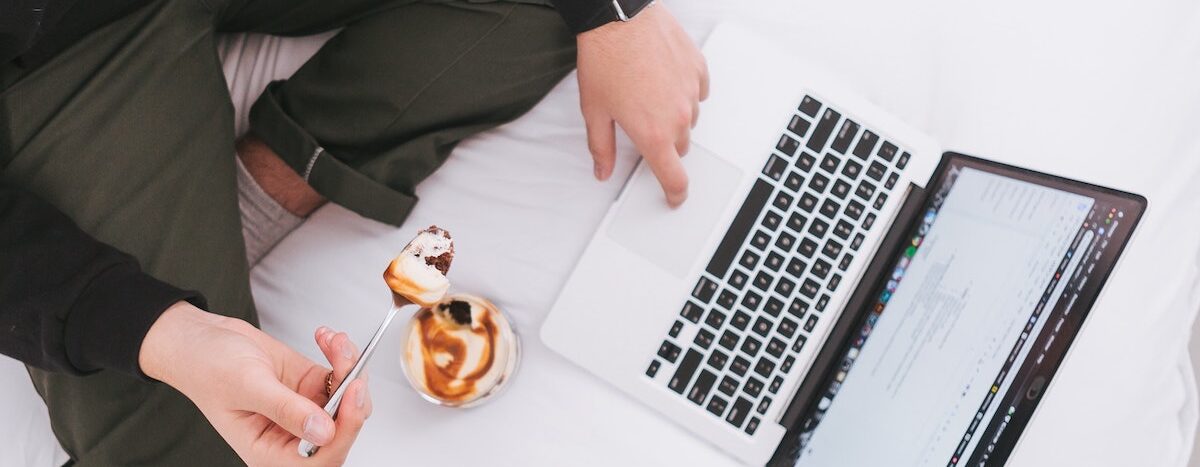
As many of you can relate, working from home certainly has its pros. Zero commute time, only having to get half dressed in the morning (or not at all?), and getting to work from the comfort of your own home. However, one major drawback is that you have 24/7 access to your kitchen. That means mindless snacking and overeating are much more likely than if you were in an office setting. So, how do you avoid this major pitfall when working from home? Read on for my top tips.
1. Take an actual lunch break (maybe a snack break, too).
Hunger, stress, and boredom are some of the top triggers that lead to overeating. Luckily, hunger is an easy one to address. You just need to properly feed your body during the day. I know it sounds simple, but a lot of people either mindlessly eat throughout the day or skip meals altogether only to overeat once work is done.
Try to take an actual lunch break, and maybe a snack break, too. Schedule in your eating times just like you would a meeting and take it just as seriously. When you are properly fueled by your meals, you won’t be triggered to overeat due to hunger.
2. Curb mindless snacking.
Mindless snacking almost always leads to overeating. So, if you want to avoid overeating, then you must avoid mindless snacking. Tip #1 (above) will greatly help you avoid mindless snacking because your meal and snack times will already be planned out. You will be less likely to open a bag of chips or candy at 4 pm if you just ate a satisfying snack at 3 pm. Make sense?
Start paying attention to when, why, and how you are eating throughout the day. If you notice that you often grab for food but don’t even realize how much you are eating, then you may be mindlessly snacking. Does this happen when you are hungry? Stressed? Bored? Overworked? The more aware you are of this habit (and why it is happening), the easier it will be to curb.
3. Stock your home office with healthy snacks.
It is much harder to overeat on a bowl of apples than to a bag of chips. The truth is, we eat what is around us. If you buy a few bags of chips and candy every week, then you will likely overeat a few bags of chips and candy every week.
It is much harder to overeat on a bowl of apples than a bag of chips.
Stock up on healthy snacks and make your options appealing and nutritious. Also, try to avoid bringing foods into your house or home office that are easy to overeat.
Some healthy home office snack options I recommend:
- fruit
- crispy chickpeas
- bada bean bada boom crackers
- kale chips
- veggies and hummus
- rice cakes and almond butter
- organic, plain full-fat yogurt
- Brad’s Veggie crackers
4. Make your food for the day ahead of time.
I have a small refrigerator in my home office. So, when I go to “work,” I take all my food for the day with me into my office. I don’t go into the kitchen at all during my work day. Now depending on where you live, this may not be doable. But, what you can do is make all your food ahead of time so you have a plan in place. The less decisions you make about what to eat during the day, the easier it is to stick to healthier options.
The less decisions you make about what to eat during the day, the easier it is to stick to healthier options.
If you don’t want to actually prep all your food for the day, then at least have an idea of what you are going to eat before your day gets started. Making a food decision while bored, stressed, hungry, tired, or overwhelmed is much more likely to lead to overeating. Do yourself a favor and pre-plan what you will be eating before you get into any of those emotional states.
5. Make sure your meals are nutritionally balanced.
Eating nutritionally balanced meals helps you to feel satisfied and energized from your food. This is what you want — to feel good after eating. You don’t want to be hungry an hour or two later. Make sure all your meals contain a protein, some type of produce (fruit or vegetable), a healthy fat, and possibly a carbohydrate. Example: instead of eating a sandwich and chips for lunch, you could opt for a power bowl of rice, chickpeas, roasted vegetables and a tahini dressing.
Being purposeful about what you are eating will help you feel better and more energized throughout the day. Because when you feel better overall, you are less likely to overeat!
- Eating Behavior (42)
- Grocery Shopping Tip (8)
- Gut Health (36)
- Healthy Eating (47)
- Low FODMAP (13)
- Nutrition Articles (31)
- Recipes (27)
- Uncategorized (4)


